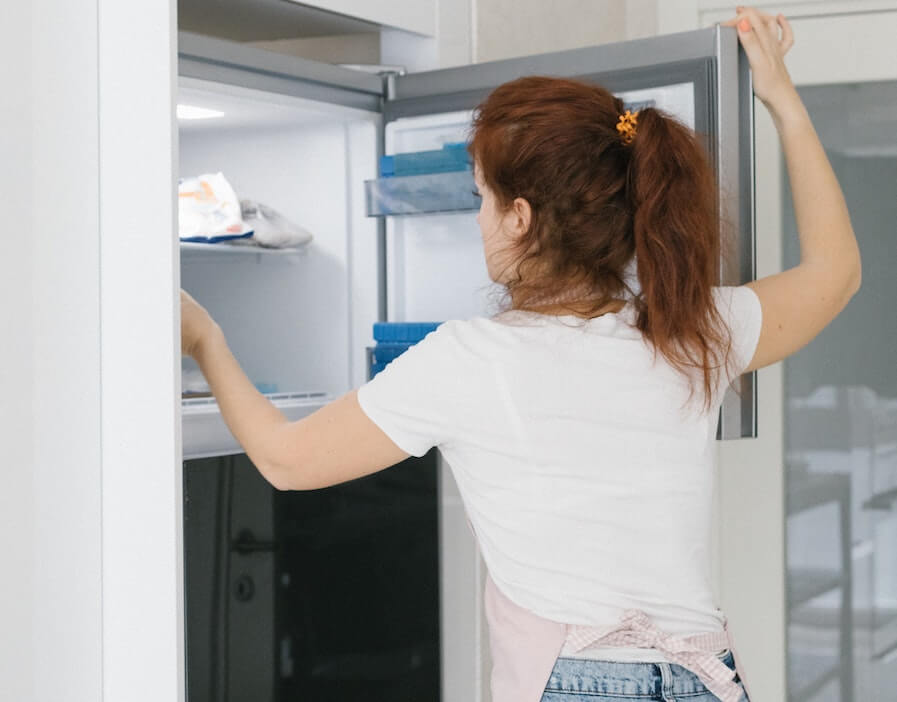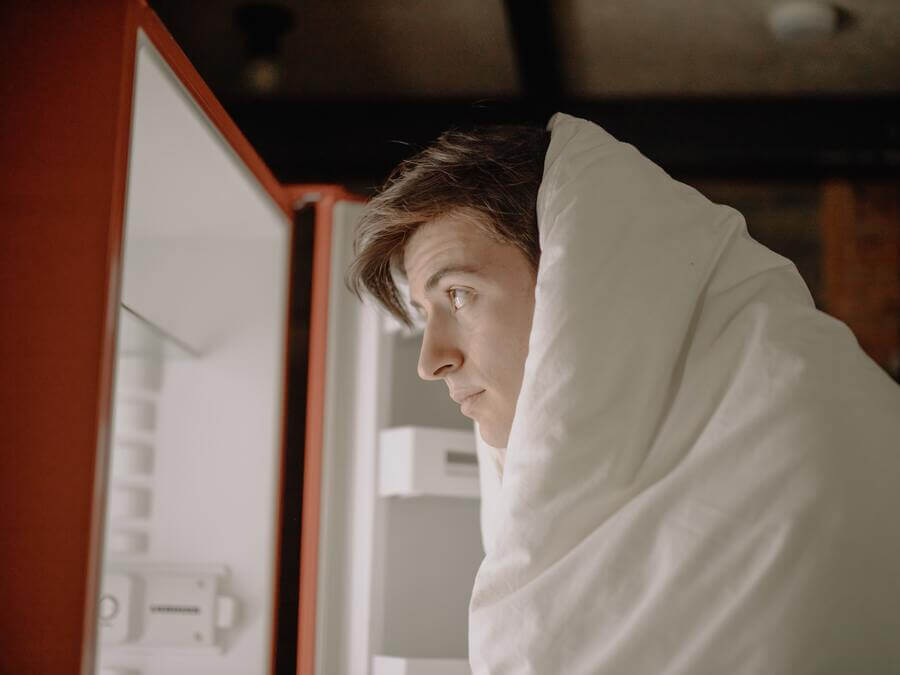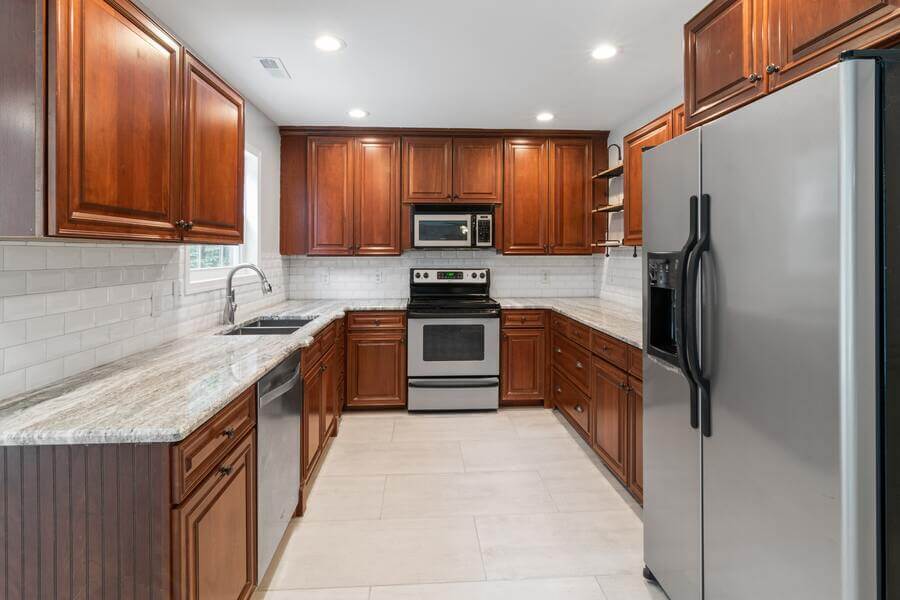Have you ever opened your freezer to find your frozen goods not so frozen anymore? Or perhaps you’ve noticed that your freezer goes through a cycle of cooling and warming up again, leaving you concerned about food safety.

Don’t worry; these issues are common, and there are often straightforward solutions to get your freezer back on track. In this blog post, we’ll explore some common causes of this issue and provide easy-to-follow solutions to help you get your freezer back on track.
Dirty or Clogged Air Vents
- Cause: Dust and debris can accumulate over time in your freezer’s air vents and cooling channels. This buildup restricts the flow of cold air, making it difficult for your freezer to maintain a consistently low temperature.
- Solution: Regular maintenance is the key to preventing this issue. Clean the air vents and cooling channels inside your freezer. You can use a vacuum cleaner with a brush attachment to remove the accumulated dirt and dust. Keeping these passages clean ensures that the cold air circulates freely, allowing your freezer to do its job effectively.
Water Leakages
- Cause: Excessive condensation or water buildup inside your freezer can significantly affect its cooling abilities. If the drainage system is blocked or not functioning correctly, it can lead to temperature fluctuations.
- Solution: Inspect the drainage system in your freezer. Make sure it’s clear of any obstructions. If you find any clogs, remove them to allow proper drainage.
Additionally, check the door seals for any damage, as a damaged seal can allow warm air to enter the freezer, causing condensation.
Incorrect Food Packaging
- Cause: When a freezer is overloaded with food and containers, it limits the airflow inside the unit. This, in turn, causes the evaporator fan to work harder than it should. Over time, the strain on the fan can lead to its motor burning out and failing altogether. The way you package your food can affect the freezer’s performance. Food items stored in improperly sealed containers or those with high moisture content can release humidity into the freezer. This can result in frost buildup and uneven cooling.
- Solution: To prevent this issue, use airtight containers for storing your food. Make sure they are correctly sealed to keep moisture out.
Additionally, consider wrapping your food securely with plastic wrap or foil before placing it in the freezer. Proper packaging will maintain the desired humidity level, preventing frost from forming.
Frequent Door Opening
- Cause: If you’re constantly opening the freezer door, warm air rushes in, forcing the appliance to work harder to maintain the low temperatures. This extra strain can lead to inconsistencies in freezing.
- Solution: To avoid this problem, try to minimize the number of times you open the freezer door. Please list what you need before opening it to reduce the time the door is left ajar. Also, ensure the door is closed tightly every time you use it. This will keep warm air out and maintain a stable freezing environment.

Faulty Control Board
- Cause: The control board is like the brain of your freezer. It regulates various functions, such as temperature settings and defrost cycles. If malfunctioning, it can disrupt the cooling process, causing your freezer to stop and start unpredictably.
- Solution: When faced with a faulty control board, it’s best to call a professional technician. They can diagnose the issue and, if needed, replace the control board. Trying to fix this on your own can take time and effort. A skilled technician will ensure your freezer functions as it should.
Power Supply Issues
- Cause: Fluctuations in the power supply or electrical problems in your home can wreak havoc on your freezer’s ability to maintain a consistent temperature. Voltage spikes or drops can confuse the freezer’s cooling system, causing it to stop freezing temporarily. Common culprits include overloading a circuit, faulty outlets, or sharing a course with other power-hungry appliances.
- Solution: To prevent power supply issues, it’s essential to have a dedicated circuit for your freezer, separate from other high-powered devices. Ensure the outlet is in good condition and the wiring is not damaged.
Consider investing in a voltage stabilizer or surge protector to safeguard your freezer against sudden fluctuations. These devices can help stabilize the power supply and protect your freezer from damage due to electrical irregularities.
Excessive Frost Buildup
- Cause: Frost buildup in your freezer can insulate the cooling coils, making it harder for the freezer to maintain low temperatures. This can lead to the freezer not freezing correctly. The frost accumulation is often caused by humidity, frequent door openings, or a damaged seal that allows warm, moist air to enter the freezer.
- Solution: To combat excessive frost buildup, regularly defrost your freezer. Please turn it off, remove the contents, and allow the ice to melt naturally, or use a safe defrosting method recommended by the manufacturer.
Ensure the freezer’s door seal is intact and clean. If it’s damaged, consider replacing it. Keep the freezer door closed as much as possible and avoid prolonged door openings to minimize humidity inside. Use airtight containers to store food, which will reduce moisture buildup.
Evaporator Fan Problems
- Cause: The evaporator fan circulates cold air within the freezer. If it fails, the freezer’s temperature may become inconsistent, resulting in freezing issues. Obstructions like ice buildup, food items, or a damaged fan can impede its operation.
- Solution: Inspect the evaporator fan for obstructions; if you find any, remove them. If the fan isn’t functioning correctly, consider replacing it.
You can usually find replacement parts and instructions in your freezer’s user manual or by contacting the manufacturer. Regularly clean the freezer to prevent ice or food buildup around the fan.
Malfunctioning Thermostat
- Cause: A malfunctioning thermostat is one of the common culprits behind a temperamental freezer. The thermostat is responsible for maintaining the temperature inside your freezer constantly. When it fails, the freezer can’t regulate its temperature correctly. This can lead to periods of inadequate cooling, followed by sudden bursts of intense freezing.
- Solution: To address this issue, you must replace the thermostat. Consult your freezer’s user manual for instructions on accessing and returning parts. It’s usually a job best left to professionals to ensure it’s done correctly. Make sure to unplug the freezer before attempting any repairs.

Low Refrigerant Levels
- Cause: Another common reason for erratic freezing is low refrigerant levels. Refrigerant is a vital component in the cooling process, and when it’s insufficient, the freezer’s performance will suffer. This often happens due to leaks or manufacturing defects.
- Solution: If you suspect low refrigerant levels, it’s time to call a certified technician. They can identify and repair the leaks and then recharge the refrigerant properly. Trying to fix refrigerant issues alone can be dangerous, so it’s best left to the professionals.
Malfunctioning Door Seal
- Cause: A damaged or worn door seal can allow warm air to seep into the freezer, causing temperature fluctuations. This can lead to the freezer stopping and starting unexpectedly.
- Solution: To fix a malfunctioning door seal, inspect it for any visible damage or gaps. If you find issues, you can typically replace the seal with a new one, following your freezer’s manual for guidance. Ensuring a tight seal is essential for maintaining consistent temperature and efficient freezing.
Conclusion
Freezers that start and stop freezing are frustrating. However, knowing the primary causes and following the solution above can typically fix the issue without costly repairs or replacements.
Also, check your freezer’s user handbook for maintenance requirements. When the problem persists despite your attempts, call a professional appliance expert for diagnostic and repair. Ultimately, a well-functioning freezer saves money on wasted food and makes cooking easier.
